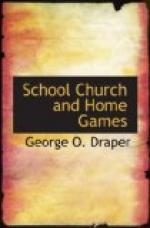Analogues
A member of the group thinks of some object, and without disclosing to the other members of the group what he is thinking about, he addresses in turn all of the others, asking, “What is my thought like?” The first one addressed, without having any idea as to what the leader has in mind, says, “Like a star”. The second in answer to his question, says, “Like a book”, and so every one is given an opportunity to state what they think his thought is like. Then the leader tells the group the thing he had in mind, which, we will say for illustration, was a fountain pen. He then asks the one who suggested that it was like a star why his fountain pen was like a star. Thereupon that one must give some reason why he thought it was like a star and replies, “Your fountain pen is like a star because it can enlighten the world”. The next one says, “The fountain pen is like a book because it has the possibility of conveying thoughts”, and so every one in the group must give the why of his previous answer. This demands quick thinking and initiative on the part of the players.
Ghost
The group sits in a circle about the room. The leader starts the game by giving a letter of the alphabet. The one at his left adds a letter to the first with the view of making a word. The third adds another letter and so the game continues.
Illustration—The leader gives the letter “a”. The one at his left, thinking of the word “adds” adds “d”. The third one, thinking of the word “advertisement”, adds “v”. The fourth, thinking of the word “adversity” adds “e”, and so the word continues to grow.
If one finishes the word or completes a word without realizing it, that one is given the title of “Half-ghost”. Anyone speaking to the Half-ghost, becomes a Half-ghost. Should a half-ghost chance to finish another word when it again becomes his turn to add a letter to the spelling of a word, then the Half-ghost becomes a Full-ghost and is out of the game. Any one speaking to a Full-ghost becomes a Full-ghost. Full-ghosts and Half-ghosts naturally endeavor to get as many others into their class as possible, so between thinking of letters to complete the word in turn and avoiding becoming ghosts, the group is kept in a very difficult frame of mind. The game continues until there are no players who have failed to qualify as Half-ghosts or Full-ghosts.
Charades
Five of the group are selected to act out a charade. These five act out a word in pantomime. While they are doing this a second group of five is selected and prepares to act out another word, immediately following the presentation by the first group. The audience is given three minutes to guess each charade. Should it succeed in doing this, then the members of the group each choose a substitute for themselves, thus making a third group of five. While this last group is preparing a charade, the second group is putting on its pantomime, and so the game continues. If the audience fails to guess the word within the required time, then the same group is given an opportunity to act another word. Good charade words are as follows:




